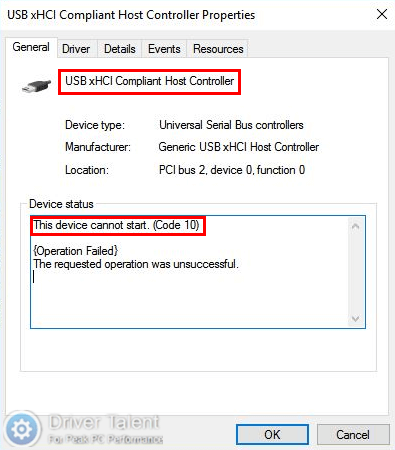- Usb Xhci Compliant Host Controller Driver Windows 10 Hp
- Usb Xhci Compliant Host Controller Driver Windows 10 Download
Where to Find Windows. 8 and Windows® 10 Intel® USB 3.0 eXtensible Host Controller Driver Where to Get Linux. USB 3.0 xHCI Drivers Intel® USB 3.0 eXtensible Host Controller Driver Not Supported in Windows XP. or Windows Vista. 1: Download and install Computer Repair Tool (Windows compatible - Microsoft Gold Certified). 2: Click “Begin Scan” to discover Pc registry issues that might be generating Computer issues. 3: Click on “Fix All” to fix all issues. Meaning of USB xHCI Compliant Host Controller - This device cannot start. USB xHCI Compliant Host Controller is a kernel device driver. In Windows 10 it is starting only if the user, an application or another service starts it. If USB xHCI Compliant Host Controller fails to start, the failure details are being recorded into Event Log. You can develop a host controller if your hardware is not xHCI specification-compliant or your are writing a virtual host controller, such as a controller that routes USB traffic over a TCP connection to the peripherals attached to a device. Your host controller driver is a client to the USB host controller extension, which is a system-supplied.


This topic highlights the new features and improvements for Universal Serial Bus (USB) in Windows 10.
Usb Xhci Compliant Host Controller Driver Windows 10 Hp
Aug 29, 2020 When your PC is equipped with the latest Intel USB 3.0 eXtensible Host Controller driver, you will not encounter the xHCI incompatibility issue on Windows 10. With reference to this post, it is likely that you know how to fix this Intel USB 3.0 Host Controller driver not working or compatible problems by updating the xHCI drivers for Windows 10. Don't know if i can help but a couple things to check. List any Problem devices. Click the Start button, type msinfo32 in the search box. Hit Enter; Click the + sign next to Components to expand it. Usb Xhci Compliant Host Controller Driver Windows 10. By ecrezhibus1973 Follow Public. USB-IF xHCI USB Host Controller has a driver problem Tried reinstalling driver but did not fix any solutions? Outdated or Corrupted drivers:10/17. Usb Xhci Compliant Host Controller Lenovo.
Usb Xhci Compliant Host Controller Driver Windows 10 Download
UCSI driver extensionStarting in Windows 10, version 1809, a new class extension for UCSI (UcmUcsiCx.sys) has been added,which implements the UCSI specification in a transport agnostic way. With minimal amount of code, your driver, which is a client to UcmUcsiCx, can communicate with the USB Type-C hardware over non-ACPI transport. This topic describes the services provided by the UCSI class extension and the expected behavior of the client driver.
USB Type-C Port Controller Interface
Windows 10 version 1703 provides a class extension (UcmTcpciCx.sys) that supports the Universal Serial Bus Type-C Port Controller Interface Specification. A USB Type-C connector driver does not need to maintain any internal PD/Type-C state.The complexity of managing the USB Type-C connector and USB Power Delivery (PD) state machines is handled by the system. You only need to write a client driver that communicates hardware events to the system through the class extension.
USB Dual Role support.
USB Dual Role controllers are now supported in Windows. Windows includes in-box client drivers for ChipIdea and Synopsys controllers. For other controllers, Microsoft provides a set of programming interfaces that allow the dual-role class extension (UrsCx) and its client driver to communicate with each other to handle the role-switching capability of a dual-role controller.
For more information about this feature, see:
New set of programming interfaces for developing a USB Type-C connector driver.
This version introduces native support for USB Type-C as defined in the USB 3.1 specification. The feature allows devices to use a reversible connector, a symmetric cable, faster charging, and Alternate Modes running over the USB cable. These programming interfaces allow you to write a driver for the connector (called the client driver in this section) that communicates with the Microsoft-provided class extension module: UcmCx to handle scenarios related to Type-C connectors such as, which ports support Type-C, which ports support power delivery.
New set of programming interfaces for developing an emulated host controller and a connected virtual device.
Windows 10 introduces support for emulated devices. Now you can develop an emulated Universal Serial Bus (USB) host controller driver and a connected virtual USB device. Both components are combined into a single KMDF driver that communicates with the Microsoft-provided USB device emulation class extension (UdeCx).
New set of programming interfaces for developing a USB host controller driver.
You can develop a host controller if your hardware is not xHCI specification-compliant or your are writing a virtual host controller, such as a controller that routes USB traffic over a TCP connection to the peripherals attached to a device. Your host controller driver is a client to the USB host controller extension, which is a system-supplied driver that follows the framework class extension model. Within the Microsoft USB 3.0 Driver Stack, UCX provides functionality to assist the host controller driver in managing a USB host controller device.
New set of programming interfaces for developing a USB function controller driver.
You can write a client driver that communicates with the USB function class extension (UFX) and implements controller-specific operations. UFX handles USB function logic that is common to all USB function controllers.
Free download corel draw 7 full version with serial key. Improved experience for USB CDC (serial) devices.
Allows devices that are compliant with the USB communication devices Class (Class_02 & SubClass_02) to work with Windows 10 by using the Usbser.sys driver. Device manufacturers are no longer required to write a custom INF to install that driver.